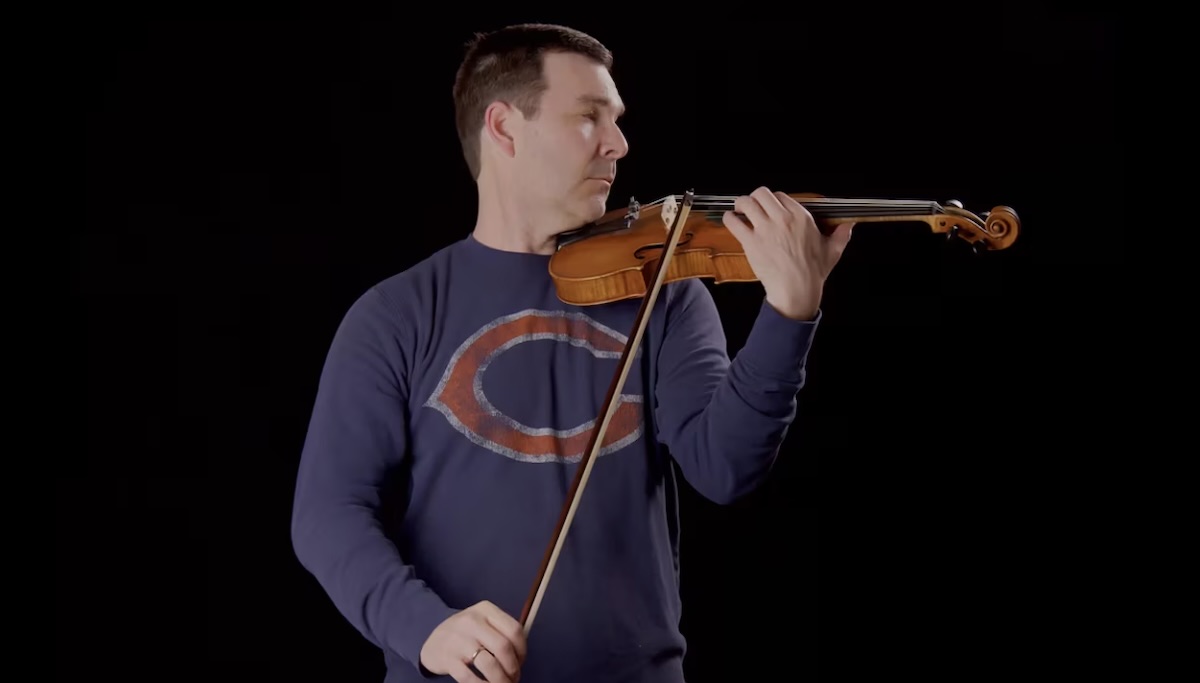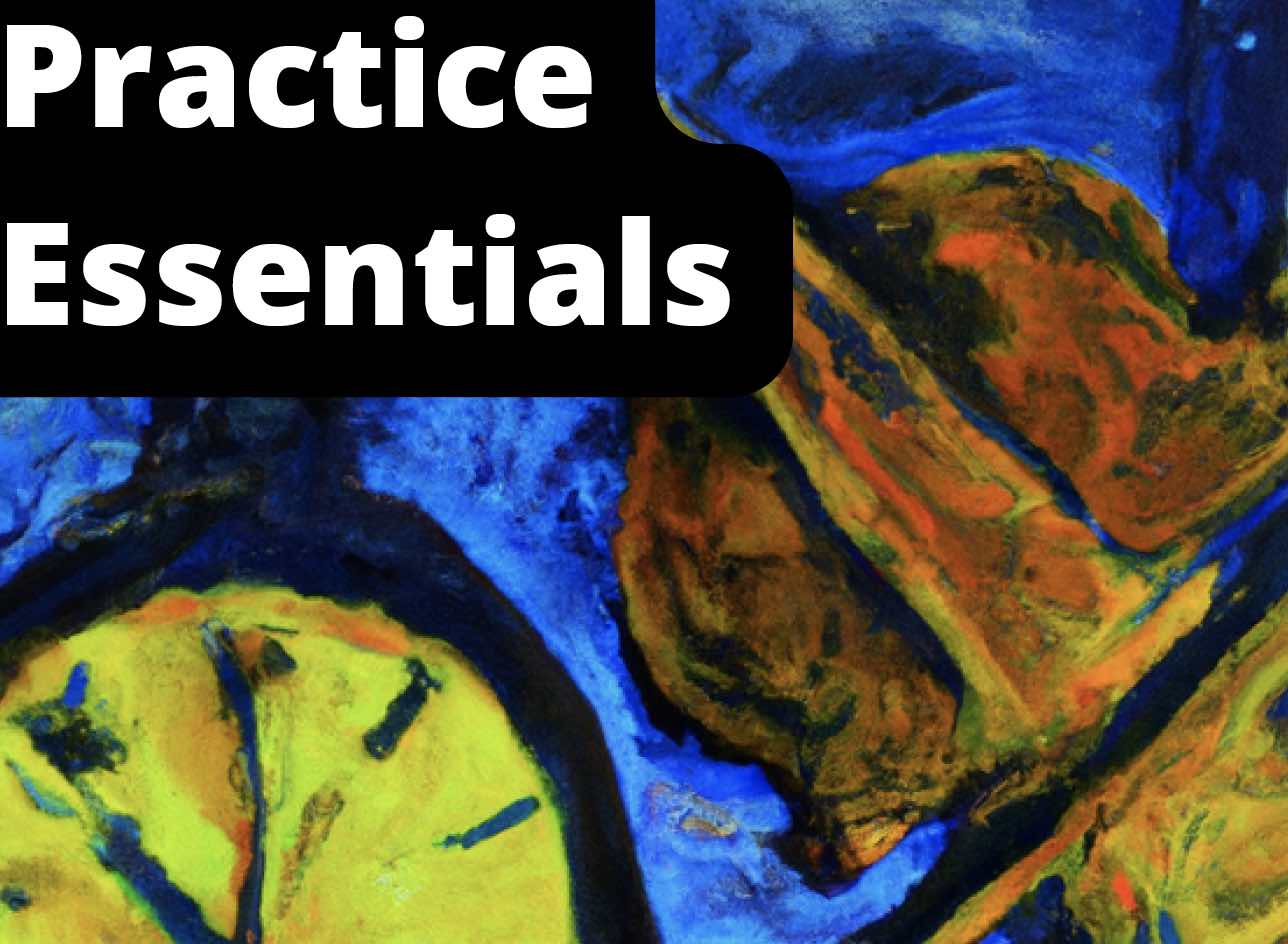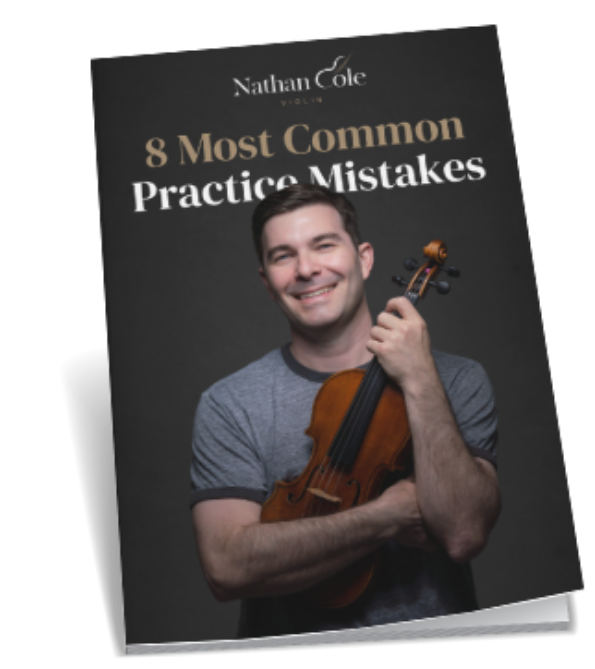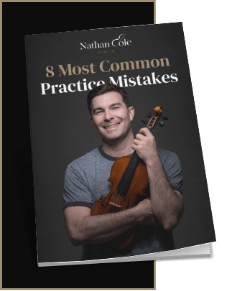Rocky is the greatest audition movie of all time

You thought Rocky was about boxing, but you were wrong.
In fact, there are a number of things you’ve forgotten about one of the greatest films ever made:
- Rocky won the Best Picure Oscar for 1976.
- Sylvester Stallone wrote the screenplay himself.
- Spoiler alert for a 40-year-old movie: Rocky loses the fight at the end!
So is Rocky really about violin auditions?
It is if you watch it the right way. Auditions are tough; audition preparation is tougher. Everything about Rocky was tough, from the mean Philadelphia streets to Apollo Creed’s sneer. Stallone even had to fight to make the movie in the first place! Even though he had never starred in a film, he refused to hand over the rights to his screenplay unless he got to play the lead. He finally found a studio that would cast him as Rocky, but they cut the film’s budget to the bare minimum.
So we’ve got a writer/actor/character fighting against the odds, and in the end he loses the big contest. Sounds like the standard audition experience, right? Of course, that’s not the end of Rocky’s story (and I’m not just referring to the series of increasingly ludicrous sequels to this great film): Rocky is forever transformed through his solo quest, despite the loss. Stallone didn’t do too badly either.
I might add that I watch Rocky before every audition I take.
So if you haven’t sat down to the original Rocky recently, “do me a favor” as Rock would say, and just watch it. But until then, here are some key moments from the film. For each one, there will be two meanings:
- The surface meaning that anyone might take away
- The Deep Audition Truth that’s revealed when you watch with violin in hand
Ready? Let me take you to the interior of a seedy boxing club in Philadelphia, late 1975:
“Comes to $40.55.”

Rocky’s first scene shows our hero fighting for small stakes against “Spider Rico”. After the match, the two fighters retreat to the filthy locker room. The manager of the club tallies up Rocky’s winning share. After charging Rocky for his corner man, shower, locker and towels, he hands over a measly $40.55.
- Surface message: Rocky is a down-and-out fighter, going nowhere.
- Deep audition truth: Rocky is going nowhere because he has no reason to go anywhere.
Spend some time with Rocky, and you’ll see that he has nothing going on in his life, other than some mediocre boxing. It’s all he’s ever known, and although he’s not happy, his imagination is pretty limited. No wonder he drifts through the days, weeks and years. Unless he gets some cold water splashed in his face and confronts who he is and who he might want to be, he’ll be stuck fighting for peanuts… minus tax, corner, shower, locker, and towel, of course.
So it is with auditions. We take them to win jobs (or at least we should). We expect those jobs to allow us to change our lives, or at least to support the other people and ambitions we care about. Otherwise, what’s the point?
Therefore the first step toward winning an audition is deciding why you want the job. Paying the rent isn’t a good enough reason. There are non-musical ways to pay the rent. My guess is that you want to make a living performing for other reasons. They may be buried deep inside you. What are they? Have them clearly in your mind when you decide to take your next audition. Otherwise, you’re just going to get beaten up.
“Ever think about retiring?”

When Rocky returns to Mighty Mick’s Boxing gym to resume his aimless training, he’s got a surprise waiting for him: his locker has been cleaned out and given to someone else, a “contender”. When Rocky confronts Mickey, who is at that moment training the contender, Mickey fires back, “Ever think about retiring?” “No.” “Think about it!“.
- Surface message: Mickey is a tough old bird who doesn’t think much of Rocky’s abilities.
- Deep audition truth: Mickey can see Rocky for who he really is.
Rocky hasn’t committed himself to his training, he smokes, and he works as a collector (a “leg-breaker”) for a local loan shark. He hangs around the gym and sometimes fights for money, but he has no business calling himself a professional boxer.
There are many ways to enjoy music as an amateur, in the best sense of the word: you can play or sing with friends and family, join community groups that perform regularly, write about music on a blog, or simply enjoy attending concerts. But making money as a professional musician requires a depth of commitment and sacrifice that not everyone is willing to make. If you aren’t, please “retire” and become a happy amateur.
“Clown? He took his best shot an’ become champ.”

While relaxing at Andy’s bar, Rocky and the proprietor watch a news report about the heavyweight champion, Apollo Creed (not so loosely based on Muhammad Ali). Andy laments that there are no more “real” (read white) fighters at the top of the ranks, calling Creed a “clown” and throwing in a racial slur for good measure. Rocky is taken aback, and after responding with the above quote, he adds: “What shot did you ever take?”
- Surface message: Rocky’s a good guy and a boxer, so he resents the barkeeper dismissing Creed as a clown.
- Deep audition truth: Rocky recognizes Creed’s greatness, but doesn’t yet understand the dedication that made Creed great.
Rocky’s phrase “taking a shot”, besides setting up a nice line for Andy involving whiskey, (“You want me to take a shot? Fine, I’ll take a shot!“) reveals something about his thinking at this point. Some people get a shot and some don’t. The ones who do might hit or miss, but the lucky ones hit it big. The thought that Apollo Creed steadily worked toward his goals is foreign to him. So while this is the first glimpse we get of Rocky appreciating something greater than himself, he’s incapable of relating Apollo’s path to his own. He looks at Creed as from another world, rather than modeling himself on the champ.
So until you look at violin playing as a journey that leads from beginner to master, you cannot believe that you are on the same path as the masters. And you will never realize the dedication and sacrifice that are required to reach the end of the path, if there truly is an end!
You can say this much for Rocky: if he won’t put himself in the same category as Apollo, he at least sees himself in a different category from Andy the bartender.
“Do you believe that America is the land of opportunity?”

Rocky gets a surprise summons: to the office of Jergens, a major fight promoter. Rocky assumes that he is being asked to become a sparring (practice) partner for Creed in preparation for his upcoming championship fight, an exciting opportunity in itself. What Rocky doesn’t know is that Creed’s high-ranking opponent has pulled out of the fight with an injury, leaving Apollo’s team scrambling to find a replacement at short notice. They see Rocky Balboa’s name in a directory of local fighters and like the sound of it. Thus Jergens stuns Rocky with this proposition: to fight Apollo Creed for the heavyweight championship of the world!
- Surface message: This is Rocky’s one-in-a-million chance! How exciting!
- Deep audition truth: Sometimes, opportunity knocks when your back is turned.
Look at Rocky’s face as Jergens hands him the chance of a lifetime. His answer to the proposition? “No.” Jergens, astonished, continues, “Apollo has seen you fight. He likes you. He wants to fight you.” We know that’s a lie, and that Apollo simply picked Rocky because of his catchy nickname, “The Italian Stallion”. And Rocky knows that he has no business being in the ring with Apollo Creed, so instead of being elated by the incredible offer, he is crushed.
In order to achieve something as meaningful as an audition win, you have to deserve it. More importantly, you have to know that you deserve it. The hardest person to deceive is the one in the mirror. When an opportunity presents itself at the wrong time, as it does for Rocky, there are only two honest responses. One is to say, as Rocky does, “I’m really just a club fighter.” The other is to light a fire under yourself and work like you’ve never worked before. Of course, you can try to seize the opportunity without doing the work, as Rocky does for a while… but eventually you’ll be forced to choose: all or nothing.
“I never had no manager.”

Mickey hears of Rocky’s incredible fortune and shows up, uninvited, to his apartment. Aware that Rocky still smarts from his dressing-down at the gym, Mickey tries to soften the mood by telling tales of his own boxing exploits: barbed wire hidden in gloves, busted noses, yellowed newspaper clippings. His increasingly pathetic refrain: “I never had no manager!” Rocky is unmoved and tells Mickey that since he never got any help before, he’ll train himself. “If you needed help, why didn’t you ask?” Mickey pleads. “I asked but you didn’t hear nothin’,” Rocky fires back. Mickey breaks down, then composes himself and leaves Rocky’s apartment with as much dignity as he can muster.
- Surface message: Here are two sad fighters, one old and one becoming old. Mickey is reaping what he has sown.
- Deep audition truth: You need all the help you can get!
Indeed, Rocky lets Mickey leave, but thinks better of it and rushes out into the South Philadelphia night to offer him his hand. The scene is framed as a long shot, letting their brief words remain just between them.
It doesn’t matter what mentors and friends have thought of you in the past, or what wins and losses you’ve piled up in years gone by. If you are in need of help (and even the greatest are at various points on their journeys), look toward those who have more experience than you. When they offer a hand, accept it!
As we’ll see, Mickey is a tough taskmaster, but that’s because he’s played the game long enough to know what it takes to win. That’s more than we can say for Rocky at this point.
Five raw eggs

Rocky decides that he’d better get serious, so he starts with good intentions. Following a routine he must have copied from a grizzled old pug at the gym, he sets the alarm for 4 AM, throws on gray sweats and serves himself a breakfast of five raw eggs cracked into a water glass (yes, Stallone really drinks the eggs). His pre-dawn run through the Philly streets ends at the Art Institute, but it doesn’t end well. After hauling himself up the steps, he’s utterly exhausted. His doubled-over frame is silhouetted against the hazy Philadelphia dawn.
- Surface message: Rocky is ready to put in the hours and pay his dues. He’s out of shape, but this is just the beginning.
- Deep audition truth: Rocky is starting out just like countless others: with a feeble resolution but no real plan.
Is Rocky paying his dues? Yes, getting up at 4 is a pain, and it’s cold inside his bachelor apartment. He does follow through with his run to the Art Institute, but by the time he gets there, the look on his face says it all: “What am I doing here?”
Until you know where you are and where you need to go, there’s no way you’re going to get there. The fact is that Rocky has serious weaknesses in his fitness and technique. As Mickey tells him earlier in the film, “You got heart kid, but you fight like a goddamn ape!” That’s not going to get him through the fight with Apollo Creed.
Unlike Rocky, you need to honestly evaluate your playing strengths and weaknesses before your practicing is going to make any sense. Because if you don’t understand why you’re making sacrifices, you certainly aren’t going to make them for long. Those 4 AM raw-egg breakfasts are going to fall away along with your motivation.
“You’re driving me crazy, you’re so sloppy!”

Mickey watches Rocky pounding the heavy bag and is unimpressed. He brings over a length of string that, he claims, cured Rocky Marciano (the boxer after whom Rocky was named) of his poor balance. Tying the string to Rocky’s ankles, Mickey restricts his foot movement and lets Rocky discover proper footwork for himself.
- Surface message: Mickey has been around a long time and knows all the tricks.
- Deep audition truth: What worked for the greats can work for you.
It’s important to note that Mickey doesn’t teach Rocky proper footwork: “Forget footwork,” he snarls. With a simple homemade “fix”, Mickey is able to let Rocky do the hard work for himself. This is the kind of discovery that “sticks”.
Through the wonders of Google and YouTube, we have access to a treasure trove of articles, interviews, and videos that reveal the training secrets of the pros. Pay special attention to the techniques that allowed the greats to make discoveries on their own. Whenever you read or hear “I became more aware…” or “I learned to listen for…”, you know you’re about to get something truly powerful and long-lasting.
“You’re gonna become a very dangerous person!”

Finally, after weeks of grueling training, Mickey gives Rocky the first pep talk he’s had in the film. In addition to the quote above, he adds, “Like the guy says, you’re gonna eat lightning and you’re gonna crap thunder!” (Who is “the guy”?) Rocky’s work may not be done, but he’s moving in the right direction.
- Surface message: Mickey is trying to shore up Rocky’s confidence since he’s never had any.
- Deep audition truth: Rocky is finally receptive to Mickey’s message because, for the first time, he knows he deserves it.
Do you think Rocky would have responded to a speech like this in the beginning of the film? He would have worn the same expression as in Jergens’ office several truths up. But now, his well-earned confidence catapults his training to another level; success builds on success.
You must keep your ears and your mind open to signs of progress, because you may not have a “Mickey” there to remind you! So you’ll have to give yourself your own pep talks. When you’re putting in the hours, with a purpose, you deserve to hear praise in addition to criticism. In fact, constant criticism is one of the surest ways to sap your motivation, making it more likely that you’ll either quit or get stuck in a rut with your practicing. Mickey speaks the truth here, and Rocky is listening.
Gonna Fly Now

The song Gonna Fly Now plays during Rocky’s training montage, which ushered in forty years and counting of musical training sequences. More importantly, Rocky’s triumphant sprint to the top of the Art Institute steps has inspired millions of Philadelphia natives and tourists since 1976. How long do you think it took me to strike the pose myself after moving to Philly at age eighteen? About 24 hours. Just superimpose my face on top of the gray sweats up there, and you get the picture. We’re even the same height, believe it or not!*
- Surface message: Rocky has finally arrived. He’s ready to face the champ.
- Deep audition truth: Rocky has never tested himself against anything remotely close to the best, so he has no idea how ready he’s not.
Rocky is about to go up against the world champion. We most recently saw him having trouble putting away Spider Rico. So he has no idea how his skills will match up with Apollo Creed. He’s certainly pushed himself to his limits, but the fact remains that he may be in for disappointment in the ring. The run to the top of the steps is a temporary high, but there’s no low like the one following elation.
Preparing for a violin audition can teach you so much about your playing. The lessons you learn will help you for the rest of your life. But until you test those ideas “in the ring”—I mean on stage—you don’t really know how prepared you are. The best audition-takers still get nervous on audition day, including me. And even though nobody is trying to knock you out, there may still be adverse circumstances when it’s your time to perform.
You can’t rely on how you feel on your best day. Audition day may feel closer to your worst, so you have to test your preparation by recording yourself, playing mock auditions, and/or playing other solo repertoire in front of an audience.
Despite my letting the air out of Rocky’s sprint up the steps, let’s be clear about one thing: if Rocky knew how to visualize, he would treasure this moment and call upon it at his hour of need. The image, the physical reality, would serve him for the rest of his life. Learn how to do this for yourself in my article on visualization!
*Stallone apparently has 2 inches on me, but I carry myself like Rocky.
“I’m sure you’re going to give us a great show.”

This is the most astonishing scene in the film. It so perfectly captures the essence of those final 24 hours before an audition.
Rocky, unable to sleep the night before the fight, actually walks to the Philadelphia Spectrum where the match will be held. The Spectrum is empty, but the scene is already set: the ring, the lights, the promotional banners. As Rocky pauses to contemplate his own larger-than-life image, who should appear but the promoter Jergens? Rocky doesn’t seem surprised to see him there, instead letting him know that his team got the colors wrong: he’ll be wearing white pants with a red stripe. “It doesn’t really matter, does it?” Jergens answers after cooly puffing on his cigar. “I’m sure you’re going to give us a great show.”
- Surface message: Apollo’s team still doesn’t take Rocky seriously, and it hurts his pride.
- Deep audition truth: Rocky literally comes face to face with the role he must play the next night, and it terrifies him.
What’s wrong with the picture is not that the colors are reversed, but that Rocky cannot imagine himself as a powerful, larger-than-life fighter whose banner is worthy of hanging across from Creed’s. The manager’s quote is only a confirmation of how Rocky truly feels about himself. He’s not a contender, but someone who is there to put on a “show”.
More auditions have been lost during that walk from backstage to center stage than at any other time. So many violinists have prepared concertos and excerpts only to realize at the moment of truth that they don’t see themselves as great players worthy of joining the orchestra they’re auditioning for. You must see yourself, throughout your preparation, as the kind of player the orchestra would be thrilled to welcome. If you can’t, then don’t audition for that orchestra. It’s as simple as that.
I have spent more hours in empty halls than most violinists, visualizing myself at zero hour, and this scene is what made me do it.
“All I wanna do is go the distance.”

After a lonely walk back from the Spectrum, Rocky faces (his version of) reality alongside his girlfriend Adrian: he can’t win the fight. It’s the most honest, and therefore the most painful, scene in the film. “It don’t matter if I lose this fight,” Rocky mumbles. Referring to the fifteen scheduled three-minute rounds of the match, he continues, “All I wanna do is go the distance. Nobody’s ever gone the distance with Creed. If I can go that distance, see, and that bell rings, and I’m still standing…then I’m gonna know for the first time in my life…that I weren’t just another bum from the neighborhood.”
- Surface message: Rocky knows he can’t win, so he sets himself an easier, though admirable, goal for the fight.
- Deep audition truth: As you count down the hours to your audition, you must find a frame of mind that will let you perform your best.
This is a tough scene to analyze. Stallone plays it perfectly, so that we really don’t know whether any part of Rocky believes he can win the fight. Rocky’s reality is fluid at this point, his confidence balanced on a knife’s edge. In desperation, he shifts his stated goal from “winning” to “doing his best”. With the weight of his life’s experience on his shoulders, it’s probably the only sane choice for him. And it might just put him in the right frame of mind for the big night.
It’s a given that you want to play your best when you audition. Therefore some people worry that focusing on winning during their preparation will distract them from doing their best. I actually take the opposite view: letting go of that desire to win will prevent you from reaching your ultimate potential.
But just like Rocky, I walk a fine line. You can read my thoughts on the question here. To summarize, I fully prepare for the win, then calmly walk out and accept the possibility of losing. Rocky has been hedging his bets the entire film, so he may or may not be ready to win his fight. But now, at the last moment, he’s decided on a clear goal. I certainly wouldn’t want to be the one standing in his way!
“This is the first time the champion has ever been knocked down!”

The fight isn’t going well for Rocky in the first round, and that’s an understatement. Creed toys with him, and the challenger appears to be totally outclassed. But with one punch, Rocky changes the dynamic and the ringside announcers are in disbelief.
- Surface message: Rocky belongs here with the champ! The fight is on!
- Deep audition truth: Exactly.
No matter what’s come before, the fight is now and it is on. Rocky stands in close and takes what shots he can, while he can. The eyes of the crowd are on him, and this is what he has been training for.
Too often, we treat auditions as though they’re figure-skating routines: play perfectly, or else; all your mistakes will count against you. Instead, carry yourself like Rocky: score points while you can. The committee’s ears are on you and only you. Now is your time. Drop any baggage you’re still carrying around and show them what you’ve got. Put the bad rounds behind you and play to your strengths.
The greatness you show on stage won’t be a collection of lucky shots. It will be a combination of your head and your heart, the culmination of your training.
“Ain’t gonna be no rematch.”

Despite suffering a broken rib thanks to Rocky’s vicious body shots, Creed is saved by the bell at the end of the fifteenth round. Rocky loses a split decision but does indeed go the distance with the champ. As the two exhausted fighters embrace, Apollo gives Rocky the message above, even repeating it for his ears only. As Rocky is pulled away, he replies, “Don’t want one.”
- Surface message: Rocky showed enough guts that Creed isn’t willing to risk his title fighting Rocky again.
- Deep audition truth: Rocky savors the moment, even in defeat.
When Creed said, “No rematch,” Rocky might as well have replied, “Don’t need one.” This fight, and the training leading up to it, will stand as an achievement for the rest of his life, announcing to the world that he has tested himself and emerged as a new person.
So let each audition stand alone. Prepare with a purpose. Then, once you go the distance, you too will walk off stage as a new person. Your playing will be transformed forever. There will be time, in the days and months ahead, to chart your future course according to what you’ve learned and what you desire. Just know that even the best players ultimately leave it in the hands of the judges. They may lose decisions. But they take stock and forge ahead.
Win or lose, savor the moment. And just as Rocky got his sequels, you’ll get your rematch!
Have you been inspired by Rocky or another movie for your audition preparation? Let me know in the comments or write to me!
Comment section
14 thoughts on “Rocky is the greatest audition movie of all time”
Leave a Reply

Scales: The Road
to Repertoire
Even if you’ve never played a scale before, violinist Nathan Cole of the Los Angeles Philharmonic will guide you through scale routines that meet you where you are, and build progressively alongside your playing.








Outstanding!
Thank you!
“You must see yourself, throughout your preparation, as the kind of player the orchestra would be thrilled to welcome. If you can’t, then don’t audition for that orchestra. It’s as simple as that.”
If only I could have *read* this one year ago this month instead of *learning it* the hard way…. OTOH, the chocolate I consumed as a reward after that audition was worth going through the process. ☺
I am an experienced enough professional to know these facts about auditions:
Committes are hearing for reasons to dismiss not to keep for the finals
The winners are not always the best players
One does not have to win an audition to be validated as a fine musician.
Hi Greg, all good points! Especially #2 and #3 which I wholeheartedly agree with. As for the winners not always being the best players, you might think of the final fight in Rocky the same way: Rocky would have won had the fight lasted even one minute more, but Creed was clearly the better boxer. Rocky had an amazing night for him, Creed was subpar, and on a different night there would have been a different outcome.
As for your first point, it’s also all too often true, although that really varies by person. There’s no real “groupthink” on a committee, which is both a strength and a weakness. Some folks look to dismiss, and others sort of keep score rather than thinking pass/fail. It’s a tough process though, and often not very musical.
“Until you know where you are and where you need to go, there’s no way you’re going to get there. ”
This is so true. There have been so many times I would wake up early and practice all day, just because. Just because I had something to prove. I think it was more for the fact that I could say I practiced 8 hours that day, not necessarily because I was working towards anything.
Having a plan has been much more important for me than just quantity of time practiced.
Thank you for writing this truly inspired, as well as inspirational blog post! There is so much wisdom here, and like so much about the violin, I wonder why it has taken me so long to find these kinds of truths. This definitely wasn’t part of my training as a music student! Perhaps one has to be ready for the information before it becomes visible.
Hello, what’s made of your shoulder support cloth? Thanks!
I ordered a piece of scrap leather (black, soft, fine grain) from a company called Brettuns Village. It cost less than $10 and I’ve been using it for close to 2 years now.
Very inspiring, Thank you.
Best,
Zach
Incredible read — exactly what I needed to hear right now! I appreciate your valuable and thoughtful insights and love your entertaining writing! Thanks, Nathan!
Thanks for checking it out, Irene! Good luck!
Amazing article!! I have never seen Rocky, but now I want to. And even if I don’t get around to it sometime soon, reading what you wrote was inspiring enough to carry me for a long time.
Bravo!
-Dave
Thanks! If you’ve never seen it, you owe it to yourself! Not just as a violinist, but as a fan of film. It deserved its Best Picture award for sure.
I recently watched Rocky again with my son, who loves film and had never seen it. He was amazed at how young Sylvester Stallone was.
This article is so much fun!
I loved hearing about you running up the steps.
The part about going the distance to become a master is great. Well, on to practicing; Sigh…
Then I will watch the movie again and run those steps too!
P. S. Check out the sound track CD from the movie too!